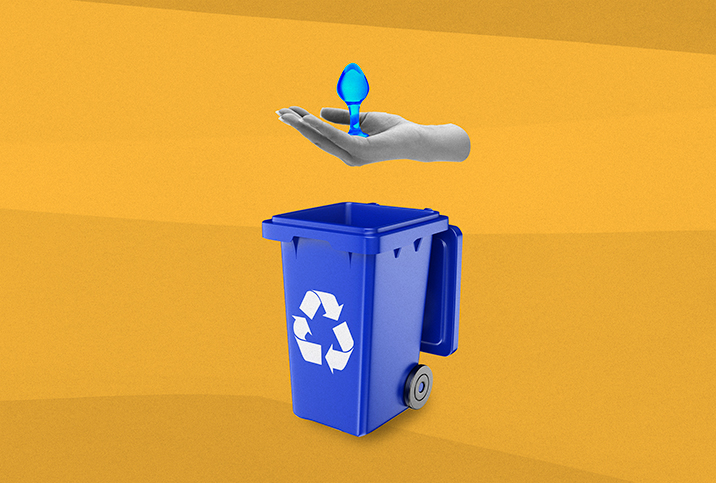Can Trichomoniasis Live on Toys? Can You Get BV From Toys?

If you've ever experienced a vaginal infection, you can likely recall the itching, burning and general uncomfortableness of it all. Vaginal infections are deeply unpleasant, but they might not stop you from wanting to relax with your favorite sex toy (no shame here!). Infection or not, a girl's gotta orgasm.
How can you safely pull out the bag of toys again? When is it time to toss old toys? Can BV or other infections live on toys? We talked to the experts and got all the answers for you.
What are the main types of vaginal infections?
There are two main types of vaginal infections: yeast infections and bacterial vaginosis (BV). A yeast infection is a fungal infection caused by an overgrowth of the bacteria Candida. Symptoms include inflammation, itchiness and unusual discharge.
Bacterial vaginosis occurs when your vagina suffers a bacterial imbalance and can include symptoms of itchiness, a "fishy" smell and unusual discharge. Most cases of bacterial vaginosis, however, actually present with no symptoms, which is why it can be difficult to know you have it.
Beyond that, sexually transmitted infections (STIs) such as trichomoniasis, chlamydia, genital herpes, gonorrhea and more can share similar symptoms with vaginal infections. As soon as something feels or smells off down there, you should see a doctor and get tested. Treatment varies by STI, so getting an accurate diagnosis is crucial.
Safely using a sex toy after BV or other vaginal infection
So you've been diagnosed and you've started treatment. When can you actually use your sex toys again?
"For most women, after the course of treatment is complete is generally best, particularly for sex toys that are inserted vaginally, such as dildos or vibrators," said Kerry-Anne Perkins, D.O., an OB-GYN in Delran Township, New Jersey, and a member of the medical board review at Women's Health Interactive.
"This not only gives the vagina time to heal but also mitigates further irritation during treatment," she explained. "Although you might be feeling better after just a couple of days of treatment, the full course of treatment will rebalance vaginal flora and pH, and allow your vagina to heal without new bacteria potentially being introduced."
Even after healing, it's not a bad idea to use a condom on your sex toys to keep bacteria at bay. If you're asymptomatic, you might not know you have a vaginal infection.
"[A condom] will prevent you from coming into contact with the surface of the toy," said Rachel Worthington, a sex educator at Bedbible, a sex toy reviewer based in Denmark. "It's actually something I would recommend doing with all toys made from porous materials, regardless of whether or not you have an infection."
Choosing the best sex toy for your vaginal health
Whether or not you're someone who suffers from regular vaginal infections, or you dealt with trichomonas or other STI, choosing sex toys that keep your vagina as happy as possible is important. There are many materials to choose from when looking for a sex toy, and it can be overwhelming to figure out what to get. If you decide on a silicone toy, you should be aware that not all silicone is made equally.
"Silicone is touted as a nonporous material, and people assume any silicone sex toy is nonporous, but some manufacturers are producing silicone blends that do not have the same qualities as medical-grade silicone," said Mayla Green, the managing director of the Adult Toy Shop in New Jersey.
"These lower-quality, and cheaper, toys are often blended with TPE, thermoplastic elastomer. These cannot be completely sterilized and can become a breeding ground for bacteria," she said.
Nonporous toys, meaning toys that are unable to be permeated by water and other fluids, are key to a healthy vagina. Bacteria can't live on these toys if you keep them clean.
"If you only have porous sex toys, such as those made from rubber blends or CyberSkin, it's best to replace those with sex toys made from nonporous materials, like silicone, that can be cleaned thoroughly and effectively," Perkins said. "Porous sex toys can hold on to bacteria, even after being cleaned, which can potentially lead to infections later on."
Sex toys made of glass might be your best bet, according to Green.
"Glass sex toys are made of borosilicate glass, similar to Pyrex dishware," she said. "It is the only truly nonporous and safe sex toy for those with skin sensitivities."
Keeping your sex toys clean
No matter what kind of sex toy you choose, keeping it clean is extremely important. Unclean toys can lead to bacteria spreading and can cause reinfections.
"Proper sex toy cleaning can help to lower the risk of infection or reinfection," Perkins confirmed. "For instance, you can get a yeast infection from a vibrator that hasn't been cleaned properly."
And not just yeast infections; an unclean toy can lead to reinfecting yourself with BV or an STI.
Thankfully, there is an easy way to keep reinfection from happening: cleaning your toys.
"You'll want to clean your sex toy before and after every use. This is good advice for anyone, but particularly for those who are susceptible to recurring vaginal infections," Perkins said.
The first step in cleaning your toys is to determine whether or not your toy is waterproof. The packaging should specify this detail, but a quick Google search can usually tell you the answer if the packaging is long gone.
"If the sex toy is motorized, make sure it's waterproof before submerging it or placing it under running water. Scrub it gently for at least 20 seconds and then rinse well. Allow it to air-dry before putting it away," Perkins said. "If your sex toy is not waterproof, clean it with mild soap and water applied to a damp washcloth instead for at least 20 seconds, and then use a rinsed-out, damp washcloth to remove the soap residue from the toy afterward."
As far as cleaning products, all our experts agreed that mild soap works just fine. If you want to use a specialty sex toy cleaner, go for it, but you don't need anything special.
You can also boil some toys made from silicone, glass or steel, Worthington added.
"Just boil a pot of water, then place the sex toys in and boil them for one to three minutes," Worthington said. "You may want to place glass and steel toys in a mesh laundry bag first to protect them and your pot."
Of course, please remember that only toys with no electrical parts can be boiled, so your vibrator should stay out of the pot.
When is it time to toss the toy?
Properly cleaned and stored sex toys should be safe to use for years. Even with vigorous and regular use, as long as they are properly cared for, high-quality toys are built to last.
"If you're using sex toys made from the right materials, cleaning them after every use and storing them correctly, your sex toys should be bacteria-free and safe to use," Worthington said.
There are times, however, when it's time to let go and get something new. If your toys are porous, now is probably the time to invest in something made from high-quality nonporous materials. Your vagina will thank you.
Perkins said: "Provided your toys are made from nonporous materials, like silicone or ABS plastic, they only need to be replaced if or when you notice damage to the material—such as tears, pitting or other signs of degradation—or when they stop working, if motorized."


















